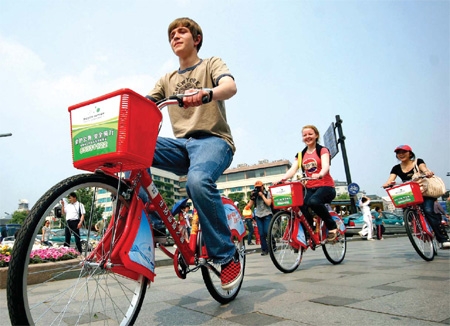Fast-growing city tries to unlock gridlock
Updated: 2010-12-17 13:09
By Shi Jing (China Daily European Weekly)
Cycle rental plan wins hearts and minds
The commuting life of Hangzhou local Song Hua has undergone a dramatic transformation over the past two years.
Before 2008, the 29-year-old 3D graphic artist was forced to spend four hours every day traveling between office and home in an arduous journey involving two bus rides and 20 minutes' walking. A one-way car ride takes less than an hour and that includes a little gridlock along the way.
But thanks to the introduction of the bicycle rental program introduced by the government two years ago, Song was blessed with one more hour of sleep every morning and after work came home an hour earlier for dinner.
|
 Two German tourists riding bikes around the West Lake in Hangzhou. [Photo/China Daily] |
But the cycling secret is out and Song now has a new problem because more of his neighbors and colleagues have discovered that the rental bikes can beat a car during the worst rush-hours.
"I do not count on the public shared bicycles any more, as everyone now is sharing the inadequate vehicles and parking space during rush hour," said Song.
"Still, I love it. Especially when I'm stuck in the traffic jam, and I know there is another option to get to work on time.
"I can jump off the bus in the middle of nowhere, as long as there is a kiosk with bicycles, and fly to work on it."
In 2008 the government rolled out 50,000 bicycles, which were placed at more than 2,000 outlets and a majority of these were located in dense business and sightseeing districts.
The program has so far attracted 69 million users, winning the city a Gallup ranking as the most traffic-friendly city in China.
The scheme has also earned the city 60 million yuan from its neighboring cities for its technology and management experience transfer.
The program allows riders to rent the specially designed bicycles from any one of the automated kiosks installed across the city. Users must buy a transportation deposit card but after this is purchased the first hour is free. Additional time costs 3 yuan an hour.
The bicycle can be returned at any kiosk any time, and is ready to be re-rented immediately.
The bikes would be rent free if a rider keeps changing a bicycle every hour. The advantages appear far more than the low cost.
Zhang Lei, professor in Public Affairs and Urban Planning of Zhejiang Industrial University, sees it through a more eco-friendly perspective.
"The use of public bicycles has reached 250,000 person-rides every day on average. Assuming each ride is a minimum of a 2-kilometer journey, the program has helped reduce 15,000 tons of fossil fuel emission and 45,000 tons of carbon dioxide," Zhang said.
"A bicycle is perfect for people taking short trips in a city with a population of 7 million and 30 million tourists. Automobiles can be traveling as slowly as 15 km/h, and only 30 percent of buses can arrive on time," he added.
According to a report released by Zhejiang University, and Zhejiang Sci-Tech University at the end of 2009, which sampled 648 residents and tourists, the bike-sharing program was most frequently used for commuting, accounting for 49.1 percent of the total use.
Among the 462 interviewees who are regular workers, more than half of them were commuting by public bikes.
One of the most striking findings is that more than a quarter of the public bike users have cars at home, and more than 40 percent of them have used or are still using public bicycles as the main transportation for commuting and city touring.
The findings are significant, especially for a city like Hangzhou, which is China's most famous hometown of the nouveau riche and the city with the largest number of automotive vehicles per capita.
Latest statistics from the local traffic department showed that the total number of automotive vehicles in Hangzhou hit 1.5 million by the end of 2009, leaving every five people in possession of one car. More than 6,000 new cars are added to the roads every month.
To meet the increasing demand for bicycles, the government is planning to add another 40,000 bicycles and 1,500 kiosks over the next five years.
The cost will run into millions of yuan in addition to the city's its 80-million-yuan annual cost of maintenance and the 150-million yuan primary investment, which the government believes can be soon covered by the income from the to-be-sold commercials on bicycles and exclusive management rights of the kiosks.
E-paper

Ear We Go
China and the world set to embrace the merciful, peaceful year of rabbit
Preview of the coming issue
Carrefour finds the going tough in China
Maid to Order
Specials

Mysteries written in blood
Historical records and Caucasian features of locals suggest link with Roman Empire.

Winning Charm
Coastal Yantai banks on little things that matter to grow

New rules to hit property market
The State Council launched a new round of measures to rein in property prices.
